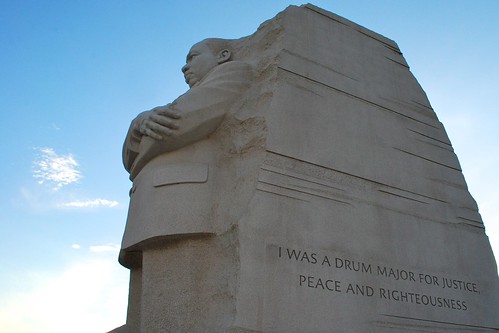The worlds of monument-building and writing don’t overlap much–but recently, the unveiling of the Martin Luther King, Jr., memorial on the national mall offered an important lesson on why every word matters. Perhaps you heard about it?
In 1968, shortly before his assasination, Martin Luther King, Jr., delivered a speech titled “The Drum Major Instinct.” In discussing what he called “the desire to be up front… the desire to be first,” he concluded:
Yes, if you want to say that I was a drum major, say that I was a drum major for justice; say that I was a drum major for peace; I was a drum major for righteousness. And all of the other shallow things will not matter.
Yet on the new memorial for Dr. King, this quote was paraphrased to
I was a drum major for justice, peace, and righteousness.
Author Maya Angelou led the criticism of the paraphrase, saying in the Washington Post:
“The quote makes Dr. Martin Luther King look like an arrogant twit,” Angelou, 83, said Tuesday. “He was anything but that. He was far too profound a man for that four-letter word to apply.
“He had no arrogance at all,” she said. “He had a humility that comes from deep inside. The ‘if’ clause that is left out is salient. Leaving it out changes the meaning completely.”
The paraphrase “minimizes the man,” she said. “It makes him seem less than the humanitarian he was. . . . It makes him seem an egotist.”
The drum major reference “wasn’t all that he was,” she said. “He would never have said that of himself. He said ‘you’ might say it.”
She said the quote should be changed to put it in context.
Told the quote had to be paraphrased to fit the available space, she replied: “Too bad.”
In an interview with NPR, the memorial’s architect, Ed Jackson Jr., sounded a mite defensive and testy:
The quote was changed to a paraphrase of the original based on design constraints. I am a fan of Maya Angelou; I have several of her books; I buy her Hallmark cards. And I think that the statement she made was very colorful, and it attracted the attention of the reader, and that’s what a writer is supposed to do. But I’m in the business of architecture […] The message had to be communicated succinctly.
Now, saying that it’s too late to change the monument is one thing–after all, the words are (literally) now set in stone, for better or for worse. But Jackson just doesn’t seem to understand what’s wrong with his paraphrase. Perhaps another example might make it clearer?
If you want to say I was an arrogant twit, say I was a handsome arrogant twit. I won’t really care about the rest.
I was a handsome arrogant twit.






